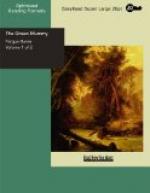“I beg pardon for coming here uninvited,” said Hervey awkwardly, “but I’ve been chasing the Don all over Pierside and through this village. They told me at the police office that you”—he spoke to De Gayangos “had doubled on your trail, so here I am for a little private conversation.”
The Peruvian looked gravely at Hervey’s face, which was clearly revealed in the powerful light of the many lamps with which the museum was filled, and rose to bow.
“I am glad to see you, sir,” he said politely, and with a still more searching glance. “With the permission of our host I shall ask you to take a chair,” and he turned to Braddock.
“Certainly! certainly!” said the Professor fussily. “Cockatoo?”
“Pardon, allow me,” said De Gayangos, and brought forward a chair, still keeping his eyes on the skipper, who was rather confused by the courtesy. “Will you be seated, senor: then we can talk.”
Hervey sat down quietly close to the Peruvian; who then leaned forward to address him.
“You will have a cigarette?” he asked, offering a silver case.
“Thanks, no. I’ll smoke a cheroot if the lady don’t mind.”
“Not at all,” replied Lucy, who, along with Archie and the Professor, was puzzled by Don Pedro’s manner. “Please smoke!”
In taking back the case Don Pedro allowed it to drop. As he made no motion of picking it up, Hervey, although annoyed with himself for his politeness towards a yellow-stomach, as he called De Gayangos, was compelled to stretch for it. As he handed it back to Don Pedro, the Peruvian’s eyes lighted up and he nodded gravely.
“Thank you, Vasa,” said De Gayangos, and Hervey, changing color, leaped from his seat as though touched by a spear-point.
CHAPTER XIX
NEARER THE TRUTH
For a few moments there was silence. Lucy and Archie sat still, as they were too much surprised by Don Pedro’s recognition of Captain Hervey as the Swedish sailor Vasa to move or speak. But the Professor did not seem to be greatly astonished, and the sole sound which broke the stillness was his sardonic chuckle. Perhaps the little man had progressed beyond the point of being surprised at anything, or, like, Moliere’s hero, was only surprised at finding virtue in unexpected places.
As for the Peruvian and the skipper, they were both on their feet, eyeing one another like two fighting dogs. Hervey was the first to find his very useful tongue.
“I guess you’ve got the bulge on me,” said he, trying to outstare the Peruvian, for which nationality, from long voyaging on the South American coast, he entertained the most profound contempt.
But in De Gayangos he found a foeman worthy of his steel.




